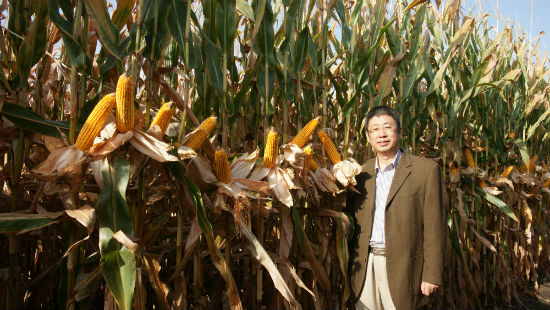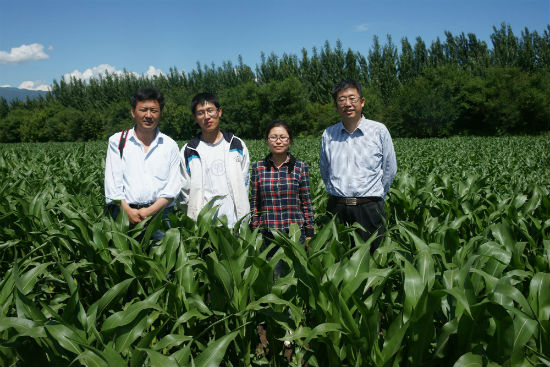分享到
Breakthrough in maize high-yielding cultivation technology
Recently, Chinese Academy of Agricultural Sciences (CAAS), Shihezi University and Agricultural Bureau of Xinjiang Production and Construction Corps (XPCG) developed and demonstrated the high-yielding maize cultivation technology in field experiment. Ministry of Agriculture tested the yield of 30 mu, found the highest yield was 1511.74 kg/mu (22676.1 kg/ha) which made a new high-yielding record.



Professor Li Shao-Kun, the chief expert of crop cultivation and physiology innovative team in the Institute of Crop Science, Chinese Academy of Agricultural Sciences (ICS-CAAS), introduced that for exploiting maize yield potential, the research team set up a yield goal of 1,500 kg per mu based on the domestic and international experience in maize high-yielding and analysis of light and heat resources in the main maize planting regions.
Since 2006, they have conducted researches on high-yielding theory and technology and carried out high-yielding experiments in more than 10 ecological regions in many provinces (autonomous regions) such as Xinjiang, Ningxia, Gansu, Shaanxi and Shandong. It took 8 years for them to achieve the goal of over 1500 kg yield this year. In 2009, 2011 and 2012, they already hit national records three times with 1360.1 kg, 1385.4 kg and 1410.3 kg per mu respectively.
Since 2006, they have conducted researches on high-yielding theory and technology and carried out high-yielding experiments in more than 10 ecological regions in many provinces (autonomous regions) such as Xinjiang, Ningxia, Gansu, Shaanxi and Shandong. It took 8 years for them to achieve the goal of over 1500 kg yield this year. In 2009, 2011 and 2012, they already hit national records three times with 1360.1 kg, 1385.4 kg and 1410.3 kg per mu respectively.

Professor Li said that six key technologies were adopted in the high-yielding fields:
-to increase soil fertility by means of returning straw and adding organic fertilizer to the fields;
-to choose new high-yielding cultivars which are suitable for high density and mechanized production;
-to take the method of high-density planting, 8700-8800 plants per mu with wide-and-narrow row arrangement;
-to build high-quality and lodging-resistant groups by means of controlling maize growth in the early growing stage and promoting maize growth in the late growing stage, and combination of fertilizer, water and plant growth regulators;
-to meet nutrient requirement for high-yielding maize by means of drip irrigation and water-and-fertilizer integration;
-to strengthen field management by means of mechanical tillage, precision planting, pest prevention and control, timely late harvest, mechanical grain harvest and other technical measures.
-to increase soil fertility by means of returning straw and adding organic fertilizer to the fields;
-to choose new high-yielding cultivars which are suitable for high density and mechanized production;
-to take the method of high-density planting, 8700-8800 plants per mu with wide-and-narrow row arrangement;
-to build high-quality and lodging-resistant groups by means of controlling maize growth in the early growing stage and promoting maize growth in the late growing stage, and combination of fertilizer, water and plant growth regulators;
-to meet nutrient requirement for high-yielding maize by means of drip irrigation and water-and-fertilizer integration;
-to strengthen field management by means of mechanical tillage, precision planting, pest prevention and control, timely late harvest, mechanical grain harvest and other technical measures.
Latest News
-
 Apr 18, 2024Opening Ceremony of the Training Workshop on Wheat Head Scab Resistance Breeding and Pest Control in Africa Held in CAAS
Apr 18, 2024Opening Ceremony of the Training Workshop on Wheat Head Scab Resistance Breeding and Pest Control in Africa Held in CAAS -
 Apr 03, 2024IPPCAAS Co-organized the Training Workshop on Management and Application of Biopesticides in Nepal
Apr 03, 2024IPPCAAS Co-organized the Training Workshop on Management and Application of Biopesticides in Nepal -
 Mar 28, 2024Delegation from the School of Agriculture and Food Science of University College Dublin, Ireland Visit to IAS, CAAS
Mar 28, 2024Delegation from the School of Agriculture and Food Science of University College Dublin, Ireland Visit to IAS, CAAS -
 Mar 25, 2024Director of World Food Prize Foundation visited GSCAAS
Mar 25, 2024Director of World Food Prize Foundation visited GSCAAS -
 Mar 20, 2024Institute of Crop Sciences (ICS) and Syngenta Group Global Seeds Advance Collaborative Research in the Seed Industry
Mar 20, 2024Institute of Crop Sciences (ICS) and Syngenta Group Global Seeds Advance Collaborative Research in the Seed Industry
